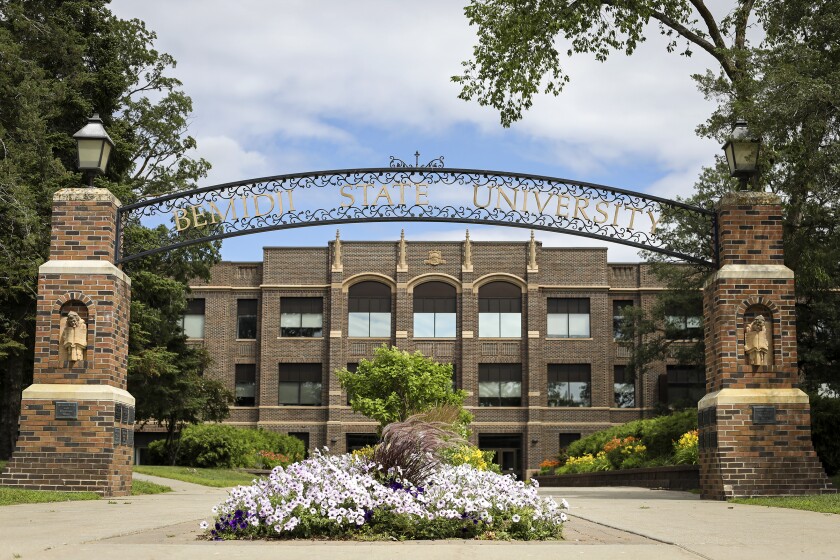BEMIDJI — Following a March announcement that 23 employees would be laid off due to revenue loss credited to decreased enrollment, another wave of layoffs looms over faculty and staff members at Bemidji State University.
In March, BSU and Northwest Technical College President John Hoffman stated that post-pandemic enrollment had dropped by approximately 20%, resulting in a $9 million deficit for the institution.
After the administration audited its budget in May, the deficit was discovered to be closer to $11 million for the 2023 fiscal year. According to Hoffman, part of the added deficit amount is attributed to early retirement incentives, of which BSU and NTC offered 63 to faculty and staff through the Board Early Separation Incentive during the initial round of cuts in March.
This program aims to encourage the early separation of select employees from Minnesota State schools in order to reduce salary and benefit obligations to achieve cost savings.
Hoffman also credited a deeper understanding of the budget to the work of administration during the re-audit in May.
ADVERTISEMENT
“In a multi-year set of projections, the deficits were bigger than what had been projected back in January, and that informed our decisions earlier this spring,” Hoffman said. “We’ve had some initial layoffs that occurred in March. Some notifications of a couple faculty (went out) earlier this summer.”
Tentatively, more significant layoffs will take place in September. Hoffman noted that employees working in admissions, student success and equity-based positions will not be affected.
'This is our home'
BSU Professor Dennis Lunt, who also serves as the president of BSU’s chapter of the Inter-Faculty Organization, expressed concern over the unknown for faculty whose positions are up in the air.
“The IFO has pressed hard for details on what cuts the administration intends to make,” Lunt said. “It’s hard for faculty to both invest in the institution and wonder if their job is going away at the same time, especially after the last few years.”
Out of the eight universities in the Minnesota State System of Colleges and Universities, Lunt added that BSU has the third lowest expenditure for instruction within its general fund.
“Thirty-nine to 42% of our expenses have been on instruction in a given year for most of the last several years,” Lunt said. “When we’re discussing cuts, our instructional capacity is really important. Faculty are creative and we can do a lot to eliminate the pain, but it’s hard to do when you’re getting more and more empty seats at the table.”
In contrast with the financial cuts announced in March, academic or co-curricular program reductions may be on the table this time around.
“I do anticipate that we will have some of our programs that are cut,” Hoffman said. “That’s a change with the revised numbers. We’re just going to have to do that, but we’re certainly prioritizing and avoiding any large-scale programmatic types of changes for the campus.”
ADVERTISEMENT
According to Lunt, administration compared the upcoming round of layoffs as “comparable to the 2010-2011 retrenchment.” Throughout that year, he said that 33 faculty were laid off and a number of majors were discontinued.
Comparing this loss to the current 171 full-time teaching faculty, cutting 33 faculty would equate to a 20% loss in BSU’s teaching capacity.
“The scale will be comparable. Our approach is a little bit different this time,” Hoffman said. “In particular, the way we’re trying to engage with faculty, with our various bargaining units, really trying to lean into our collective shared governance to get to those final solutions.”
Lunt noted actions that the IFO has taken to try to aid BSU in the midst of its deficit projections, which have even included faculty taking pay cuts.
“We knew our institutions were about to take a body blow,” Lunt said. “I watched (faculty) go for a year without raises. I watched them reinvent their jobs during COVID. I just watched them graduate a really large class of students that went through COVID.
“This is our home and these are our students and we’re going to keep protecting it.”
Delivering on a promise
While exact enrollment figures are currently unknown for the upcoming school year, Hoffman noted an increase in students signed up to live in on-campus housing and an increase in certain class offerings compared to previous years.
“We had that large outgoing class and this incoming class is not going to completely offset (the deficit),” Hoffman said, “but right now, it looks like it’s certainly going to help close the gap.”
ADVERTISEMENT
Hoffman and Lunt also referenced the Minnesota State System's approval of an undergraduate tuition freeze for the upcoming school year, for which tuition will remain at the same level as the 2023 fiscal year. Tuition averaged $8,685 at the system’s universities and $5,471 at its colleges that year.
A higher education funding bill for the 2024-2025 biennium, which encompasses the tuition freeze, includes provisions on the “North Star Promise.”
According to a release, this scholarship program will provide access to public higher education without tuition cost for students from families with annual incomes of less than $80,000. This program will become available in the 2025 fiscal year.
Providing some financial relief for families, Lunt noted additional scholarship programs for students in foster care and a $17 million scholarship fund for American Indian students. Such incentives are some ways that he hopes BSU could change its trajectory in terms of enrollment — and in turn, its budgeting shortfall.
“BSU is the place where you deliver those kinds of programs and let this area make full use of those funds,” Lunt said. “I want to make sure that we have the full breadth of programs open so that we can deliver that North Star Promise.”






